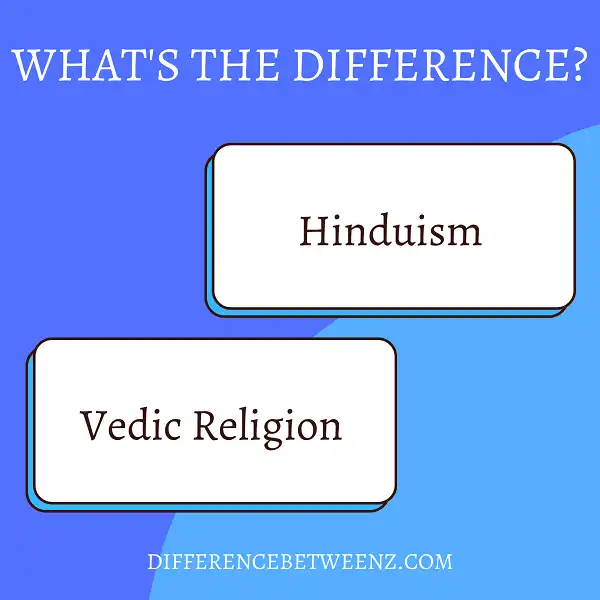There is a lot of confusion about the difference between Vedic Religion and Hinduism. Many people think that they are the same thing, but this is not accurate. Vedic Religion refers to the earliest incarnation of Hinduism, which is based on the Vedas, or ancient scriptures. Hinduism, on the other hand, developed later and includes many additional beliefs and practices. If you are interested in learning more about these religions, this blog post will explain the key differences between them.
What is Vedic Religion?
Vedic Religion is the ancient religion of India that laid the foundation for what is now known as Hinduism. The Vedas, a collection of sacred texts, are the central scriptures of the Vedic Religion. The Vedas are believed to be the oldest religious texts in the world and they provide insight into the beliefs and practices of Vedic Religion.
- Vedic Religion is polytheistic and focuses on the worship of a variety of gods and goddesses. One of the most important aspects of Vedic Religion is ritual sacrifice. Hindus believe that by performing sacrifices, they can please the gods and receive their blessings.
- Vedic Religion also emphasizes Dharma, which is often translated as “righteous living”. Hindus believe that by following Dharma, they will live a life in harmony with the natural order of things.
- Hinduism, on the other hand, is a much more diverse religion that developed from Vedic Religion over time. Unlike Vedic Religion, Hinduism is not centered around a specific scripture or set of beliefs.
Instead, Hindus believe in a variety of different deities and practice a variety of different rituals. While Hinduism shares some similarities with Vedic Religion, it is ultimately a very different faith.
What is Hinduism?
- Hinduism is one of the oldest and largest religions in the world, with over 1 billion followers worldwide. Hinduism is a complex religion with a wide variety of beliefs and practices. At its core, Hinduism teaches that there is one supreme reality known as Brahman.
- Hindus believe in reincarnation, and that the soul goes through a cycle of birth, death, and rebirth. Hinduism also teaches that humans can attain liberation from this cycle through knowledge and self-realization.
- Hinduism has a rich tradition of philosophical thought, and its texts cover a wide range of topics including ethics, cosmology, and spirituality. Hinduism is also notable for its diversity, with different schools of thought and practice existing side by side. As a result, Hinduism is an incredibly complex and diverse religion.
Difference between Vedic Religion and Hinduism
Vedic Religion is the ancient religion of India that laid the foundation for what is now known as Hinduism. The Vedas, a collection of sacred texts, are the central scriptures of the Vedic Religion. The Vedas are believed to be the oldest religious texts in the world and they provide insight into the beliefs and practices of Vedic Religion.
- Vedic Religion is polytheistic and focuses on the worship of a variety of gods and goddesses. One of the most important aspects of Vedic Religion is ritual sacrifice. Hindus believe that by performing sacrifices, they can please the gods and receive their blessings.
- Vedic Religion also emphasizes Dharma, which is often translated as “righteous living”. Hindus believe that by following Dharma, they will live a life in harmony with the natural order of things.
- Hinduism, on the other hand, is a much more diverse religion that developed from Vedic Religion over time. Unlike Vedic Religion, Hinduism is not centered around a specific scripture or set of beliefs.
Instead, Hindus believe in a variety of different deities and practice a variety of different rituals. While Hinduism shares some similarities with Vedic Religion, it is ultimately a very different faith.
Conclusion
Vedic Religion is not the same as Hinduism. The two have different histories, beliefs, and practices. While Hindus may consider themselves to be followers of the Vedic religion, not all Vedics do. It is important to understand the distinction between these two religions in order to have a more accurate understanding of Indian culture and history.


